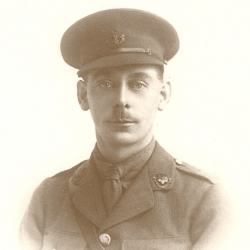Oliver Jepson Sutton was born in Stretford on July 29, 1882. His father Charles William Sutton was the head librarian of Manchester from 1879 to 1920. His mother, Sarah Hannah Winder Sutton, died when he was 7 years old and his father married Maria Pocklington just over 2 years later.
He had 3 brothers and one half brother. Charles Evans Sutton, John Francis Sutton and Albert Bernard Sutton. His half-brother George William Sutton was born in January 1893.
Oliver was educated at William Hulme’s Grammar School, Manchester. By 1911 he was working as a librarian at John Rylands Library in Manchester and living with his father, step mother and half-brother (who was also a librarian) at 323 Great Clowes St, Higher Broughton.
A former private in the 6th Manchester Regiment, he was commissioned into the 1/9th Battalion Manchester Regiment on September 2, 1914 along with several others. Around the same time, his younger half-brother George William Sutton was commissioned into the 1/8th Lancashire Fusiliers. Both brothers joined the 42nd East Lancs Division at Chesham Fold Camp at Bury; Oliver to the 1/9th Battalion Manchester Regiment of the 126th Brigade and George to the 1/8th Lancashire Fusiliers Battalion of the 125th Brigade. They sailed with their Battalions to Egypt in September 1914 serving with them there throughout their training and preparation for action. On February 9, 1915 Oliver was promoted to Lieutenant. Oliver landed with the 1/9th Manchesters in Gallipoli on May 9, 1915, his half-brother William a few days earlier. But William didn’t last long, as on June 6, 1915 he was wounded and medically evacuated to England.
On the evening of July 10, 1915 Lt. O.J. Sutton volunteered to make a reconnaissance of the new trenches being dug by the Turks. He went out under cover of darkness with Sergeant Harry Grantham and the following night went out again to verify their observations. Sgt. Grantham later described the event to the Ashton Reporter:
“Lieut. Sutton and myself went out two nights in succession, July 10th and 11th. We each took a piece of rope with us, attached to our wrists and to the parapet of our trench. We pulled it along with us until we reached the Turkish trenches, and so were able to measure the distance between our trenches and theirs. The Turks saw us, but we ran about five or ten yards, and then lay flat on the ground among dead Turks. It was somewhat exciting, especially when they fired at us, but luckily we were missed. Both General Prendergast and General Douglas congratulated us.”
The Battalion went into the trenches again on Aug 7th and two platoons under Lt. Sutton proceeded to reinforce the firing line on the right at 2:30pm. Shortly after arrival, Lt. Sutton was wounded in the shoulder by shrapnel and eventually had to go back to the Casualty Clearing Station. He was subsequently evacuated to hospital in Cairo where he remained for 75 days before rejoining the Battalion in Gallipoli on October 21, 1915. Upon his return he was immediately appointed temporary Captain while the Battalion was in the trenches. 3 weeks later, his brother William rejoined the 1/8th Lancashire Fusiliers having recovered from his wounds.
On January 28, 1916 Lieutenant Sutton, who was now serving with the battalion in Egypt, was mentioned in despatches of General Sir Ian Hamilton and awarded the Military Cross on February 1st for his reconnaissance work of July with Sgt. Harry Grantham (who had been awarded the DCM).
In May 1916 he was awarded 33 days leave in the UK returning on June 19, 1916. By September 1916 he was temporary commander of C Company relinquishing command to Major T. E. Howorth in December upon Howorth’s return to the Battalion.
He sailed with the Battalion to France, arriving March 11, 1917 and in June 1917 was promoted to Captain with precedence from November 9, 1916. On May 3, 1917 he was appointed temporary adjutant. He took 14 days leave to the UK from June 5 – 19. He took 5 days leave in Paris from August 14-19 and 13 days hone leave in the UK from October 20th to November 2nd.
On March 21, 1918 the 9th Manchesters were serving in the in the 198th Brigade of the 66th (2nd/East Lancashire) Division. The 9th Battalion were in the support line at Hervilly, East of Péronne, on the evening of March 20, 1918. The entire divisional front came under an intense artillery and gas bombardment starting at 4.40am and the Battalion was quickly moved up towards the front and by 4pm on the afternoon of March 21st, 2 Companies of the 9th Battalion were in front of Trinket redoubt. The following is excerpted from a report on operations March 21/22 by Lt. Col. EC Lloyd, Commanding Officer of the Battalion at that time:
“March 22, 1918. At about 10:30am a barrage was put down in the rear of the trenches, which was at first taken to be that of the enemy, but it increased in volume and two direct hits came on the Battalion Headquarters killing one company commander [Capt. DB Stephenson] who was there and severely wounding the Adjutant [Capt. OJ Sutton]. … A pigeon basket was luckily found and despatched to ask our artillery to cease fire.”
Around noon the battalion was forced to retire from their position under heavy enemy machine gun fire from both flanks. Captain Oliver Jepson Sutton, M.C., was reported wounded and missing in action on March 22, 1918. His body was never recovered and he is commemorated on the Pozieres Memorial, France. Captain Sutton was 35 years old.

